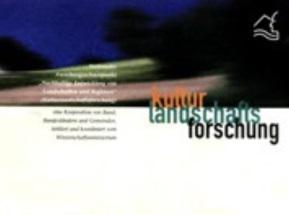From Information to Knowledge

From Information to Knowledge – Von der Information zum Wissen
 “From Information to Knowledge” describes the upcoming research landscape “Sustainability” by investigating the case of the research programme “Austrian Landscape Research” (ALR). ALR works on the scientific basis for a sustainable development of the Austrian landscape and regions and manages fields of research from biodiversity and quality of life, to genesis and transformation of (cultural) landscapes and rural development. By combining quantitative statistical data (Bibliometric quantitative methods such as Co-Word Analysis, Cluster Analysis) with qualitative methods from social science (objective hermeneutics, artefact analysis)., the project results allow to identify and combine main topics, terms and words that are at the core of the Austrian Landscape Research Programme. The Austrian landscape research (ALR) as an example for the upcoming research landscape of sustainability is the topic of this project. An innovative combination of methods combines the bibliometric method BibTechMon (Bibleometric quantitative procedures like the Co-word Analysis, cluster analysis and horizontal section analysis) with sociological qualitative procedures (artefact analysis and objective hermeneutics) and a linguistic approach, allows to identify and combine central topics, words and word combinations in their original context.
“From Information to Knowledge” describes the upcoming research landscape “Sustainability” by investigating the case of the research programme “Austrian Landscape Research” (ALR). ALR works on the scientific basis for a sustainable development of the Austrian landscape and regions and manages fields of research from biodiversity and quality of life, to genesis and transformation of (cultural) landscapes and rural development. By combining quantitative statistical data (Bibliometric quantitative methods such as Co-Word Analysis, Cluster Analysis) with qualitative methods from social science (objective hermeneutics, artefact analysis)., the project results allow to identify and combine main topics, terms and words that are at the core of the Austrian Landscape Research Programme. The Austrian landscape research (ALR) as an example for the upcoming research landscape of sustainability is the topic of this project. An innovative combination of methods combines the bibliometric method BibTechMon (Bibleometric quantitative procedures like the Co-word Analysis, cluster analysis and horizontal section analysis) with sociological qualitative procedures (artefact analysis and objective hermeneutics) and a linguistic approach, allows to identify and combine central topics, words and word combinations in their original context.
This has developed the following theoretical system:
Thesis 1 — Future: Sustainability research deals with the perspective of future ways of life and considers “to protect and to maintain” as basic values.
Thesis 2 — Causality: Sustainability research has a larger view than the cause-effect-theorem of natural sciences and sets the context of a more complex notion of reality based on understanding.
Thesis 3 — Idyllic Natures, Demiurgically Man: The concept of nature as whole is an underlying concept in sustainability research as well as a concept of “man as creating individual”.
Thesis 4 — Spaces of Possibilities: Sustainability research is based on the idea that man/ woman disposes of spaces of possibilities for his or her actions; but it tends to overestimate and overrate the
possibilities of decision making by the singular individual and underestimates the societal context and the constraints of value systems, of culture and politics.
Thesis 5 — Relocalisation: Sustainability is related to place and space and shows conflicts of usage in the example of common living places.
Thesis 6 — Complexity: The integrative approach of sustainability research creates a compatible research methodology: interdisciplinary, transdisciplinary and thereby team research.
Thesis 7 — New Research Questions: Sustainability research takes up new research fields: this research reveals latent aspects that are not yet fully thought out and are therefore a challenge for science.
More about From Information to Knowledge
Dr. Heidi Dumreicher, Dr. Bettina Kolb
Research Team:
Oikodrom, The Vienna Institute for Urban Sustainability:
Dr. Heidi Dumreicher (Project Manager, Linguistics)
Dr. Bettina Kolb (Social Science)
Translation: Ina Ivanceanu
Austrian Research Center Seibersdorf:
Dr. Markus Knoflacher (Biology, BibTechMon)
DI Alexander Kopcsa (Technical Mathematics)
MaR 2001 — JUN 2005
Published in German: Dumreicher, Heidi (Ed.): Von der Information zum Wissen, Die Forschungslandschaft der Nachhaltigkeit aus bibliometrischer und hermeneutischer
Sich. Das Beispiel österreichischerKulturlandschaftsforschung.
Bundesministerium fur Bildung, Wissenschaft und Kultur,Wien 2005,ISBN 3-85224-228-9
Project lead,linguistics:
Heidi Dumreicher
Project partner:
ARC Seibersdorf Research
(BibTechMon)
Research team: Markus Knoflacher (Biologie, BibTechMon) Bettina Kolb (Social science) Alexander Kopcsa (Technical mathematics)
Text basis: 389.803 Words,
Standardised Vocabulary: 20.489 Words
CD withdynamic database and network images Coword-analysis
